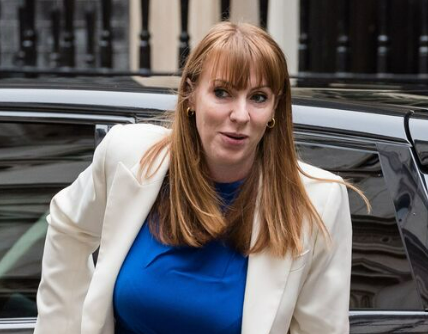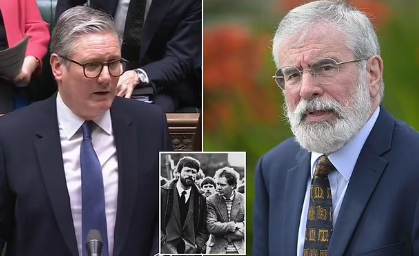Protesters lay wreath for the death of farming as they block Whitehall with tractors in campaign against Keir Starmer’s inheritance tax grab_Nhy
Angry farmers were seen laying a wreath outside Downing Street and blocking Whitehall roads with tractors as part of their campaign against the Government’s inheritance tax raid.
Thousands of farmers gathered in London today to protest Keir Starmer‘s ‘toxic’ proposals – just weeks after a similar protest saw former Top Gear presenter Jeremy Clarkson lead speeches against the Budget in Whitehall.
Once again, the Government’s plans came under fire on several fronts in Parliament, with critics claiming the new rules would put their businesses, futures and food security at risk.
As well as lining the streets with their tractors, the protesters also held a minute silence in the Westminster streets ‘for all the farmers who are no longer here’ amid ongoing concern for the wellbeing of those facing the impacts of the changes.
Labour has said its support for farmers is ‘steadfast’ – but there is ongoing outrage from rural communities about Rachel Reeves‘ announcement that farms will no longer be exempt from paying inheritance tax.
As well as the introduction of a 20 per cent inheritance tax rate on farms worth more than £1 million, Labour are also planning to speed up the phase-out of EU-era subsidies in favour of nature-friendly farming payments.
Today in the House of Commons Sir Keir Starmer told Prime Minister’s Questions the row is being caused by ‘Tory fearmongering’.
Answering a question from Ed Davey, he said: ‘In relation to inheritance tax, as he knows the threshold is £3 million and the vast majority of farmers will be unaffected despite the fearmongering of the party opposite.’

Protesters also held a minute silence in the Westminster streets ‘for all the farmers who are no longer here’ amid ongoing concern for the wellbeing of those facing the impacts of the changes

Thousands of farmers lined the streets of Westminster with their tractors to protest Keir Starmer’s ‘toxic’ proposals

Farmers say the new inheritance tax rules would put their businesses, futures and food security at risk
It comes as a new government report published today warned long term declines in ‘natural capital’ – resources such as clean water, healthy soils and wildlife – is a pressing risk to UK food production.
After 13,000 people rallied last month, tractors travelled into the capital from across the country on Wednesday, including from Exmoor, Shropshire, Somerset and the home counties, for the latest protest.
Tax experts have said that up to 75,000 farm owners could be hit by the tax changes.
Dozens of tractors lined up in Whitehall, with the first arriving with much fanfare, honking and drawing cheers from some passersby near Parliament Square in central London.
Some were decorated with signs that read: ‘No farmers, no food’, ‘Not hungry, thank a farmer’, and ‘Save British Farming’.
Another sign read ‘Starmer Farmer Harmer’, and a second one ‘Reeves and Starmer, grave robbers’.
Will Elliott, aged 50, drove his tractor for three hours from his farm near Grafham, south of Guildford in Surrey, to attend the protest. His farm, Whipley Manor Farm, predominantly grows cereal crops and grass that they make into hay.
He said: ‘The industry is already down on its knees and this is just another kick in the teeth. My family have been farming in Surrey for nine generations within about 5 miles. I’m the fourth generation to run our current farm.

A coffin draped in the Union flag appears to be symbolising the death of British farming

Tractors line up near Parliament during Wednesday’s ‘RIP British Farming’ protest, which also features a coffin

Dozens of tractors line up on Whitehall, complete with Union Jack flags and placards

Tractors blocked roads in central London on Wednesday bearing placards criticising Sir Keir Starmer and the government
‘Obviously, the idea is that we want to pass it down to the next generation, but farmers are asset-rich, cash poor, we’re not going to have the money to pay the inheritance tax. In Surrey, for instance, it doesn’t take much to reach the million pounds.’
He argues the Government have been ‘misguided’ on farmers’ ability to pay inheritance tax, forcing farmers to sell parts of their land, cattle, flock, or machinery to afford to pay for the tax.
He said: ‘They got the wrong data and way more farmers are going to be affected than what they say. We’ll lose the fabric of the rural countryside.
‘Farms will get split up, the land is not going to get taken care of, we’ll lose habitat – and more importantly, we’re not going to be able to grow the food if we haven’t got the farms.’
Earlier, farming, land and tax experts told the Environment Committee the policy would unlikely have the intended effect of closing a loophole, which enables wealthy people to buy up agricultural land to avoid inheritance tax.
Dr Arun Advani, director of the think tank CenTax, told MPs it is likely the inheritance tax changes will only ‘slightly’ slow land price inflation.
He said a 20% per cent rate is ‘still much more attractive than other sorts of assets’, meaning farmers will continue to compete with wealthier people purchasing agricultural land for tax purposes.
Asked whether there is unnecessary concern over paying the tax, Jeremy Moody, secretary and adviser at the Central Association of Agricultural Valuers (CAAV), said the strategies ministers have outlined for how farmers will pay the tax over 10 years are ‘simply not realistic’.

Anti-Brexit protester Steve Bray was spotted holding placards during the protest by farmers in Westminster

Hundreds of farmers are expected to arrive in Westminster with tractors today in a further protest against inheritance tax changes

Tractors are given a police motorcycle escort as they arrive in Westminster on Wednesday

Farmers protest in Westminster ahead of speeches and a ‘slow drive’ later today
Mr Moody said CAAV modelling shows the cost of paying the tax over a decade could amount to around three-quarters of an extra employee on the business.
‘It is a very significant shock on what the business can actually pay out of earnings, leaving only not much, if anything, left for breakfast or for reinvestment,’ he said.
Stuart Maggs, head of tax and partner at Howes Percival law firm, warned the committee that agricultural estates get a rate of return of about 0.5% to 1%.
‘It simply means this is going to be unaffordable and so farms are going to have to sell land or sell up. And it’s going to happen a lot.’
He later added it will be the ‘unfortunate’ who are most caught by the changes, such as those who die early and those who cannot plan.
‘By any measure that has to be a bad way to draw up a tax,’ he said. ‘To tax the unfortunate I don’t necessarily think is the right way the Treasury should be bringing things together.’
Farming leaders told the committee they had all written to the Prime Minister, asking for a pause and a full consultation to find a solution to the loophole that works for everyone.
Victoria Vyvyan, president of the Country Land and Business Association, said: ‘Let’s stop and think. Let’s not just crash forward, hoping against hope that this will turn out alright or it will turn out differently.’

Reform leader Nigel Farage is pictured at the farmers’ protest in London this morning

The government’s changes to inheritance tax, announced in the last budget, have sparked fury in rural communities

Farmers are up in arms about changes which mean they are no longer exempt from inheritance tax

A transporter carrying tractors on Millbank in Westminster, London, ahead of today’s farming protest

A man in a Santa Claus costume poses in front of a tractor near Parliament

Tractors park up on Whitehall next to the Cenotaph during Wednesday’s protest
Tom Bradshaw, National Farmers’ Union president, started crying as he spoke about the risk that the tax changes pose to farmers taking their lives.
‘No policy should ever be published that has that unintended side effect,’ he said.
Addressing arguments that money does not necessarily trigger this response, he became emotional as he said: ‘It’s not money. This is a lifetime of work, it’s the heritage and the custodianship of their farm.’
Asked whether Sir Keir had a message for farmers who are protesting in Westminster on Wednesday, the Prime Minister’s official spokesman said: ‘This Government recognises that food security is national security; that’s why we remain steadfast in our support for farmers.’
Asked whether there would be any rethink on inheritance tax, the spokesman added: ‘No. We have been clear that we understand the strength of feeling about the changes, but we are clear this will only affect a small number of estates.’
The ‘RIP British Farming’ protest has been organised by Kent Fairness for Farmers and Save British Farming in response to the ‘toxic’ Budget, which included changes to inheritance tax for agricultural businesses and a faster phaseout of EU-era subsidies in favour of environmental payments.
Defra also announced new details of its environmental land management schemes, which pay farmers for ‘public goods’ ranging from healthy soil, rivers and hedgerows, to habitat creation and large-scale nature restoration work.
And today a Government report found the UK was 75 percent self-sufficient in the food that can be grown in this country in 2023, and produced the equivalent of 62 percent of overall food consumed.

Dozens of tractors lined up near Parliament in the build up to protests on Wednesday

Experts have called the changes ‘unaffordable’ for farmers and warn some will face selling up

Tractors are driven through Westminster, London, as Labour claims its support for farmers is ‘steadfast’
The figures are broadly unchanged over the past two decades, but the report also warned long term declines in ‘natural capital’ – resources such as clean water, healthy soils and wildlife – is a pressing risk to UK food production.
The report also said extreme weather continues to have a significant effect on domestic production, particularly arable crops, fruit and vegetables.
And the UK continues to be ‘highly dependent’ on imports to meet demand for fruit, vegetables and seafood, which are significant sources of nutrients for consumers, and many of the countries this food is imported from face their own climate-related challenges and sustainability risks, the report said.
The food security report must be published every three years under the Agriculture Act 2020, and is the first since December 2021.




